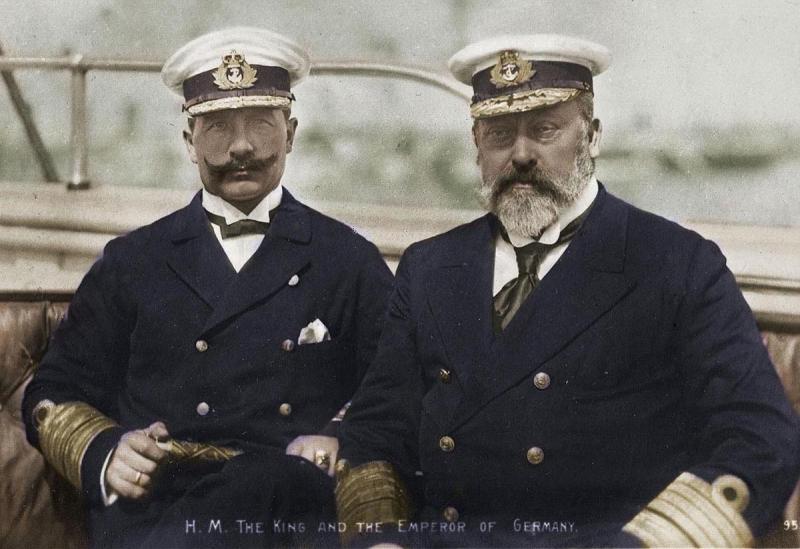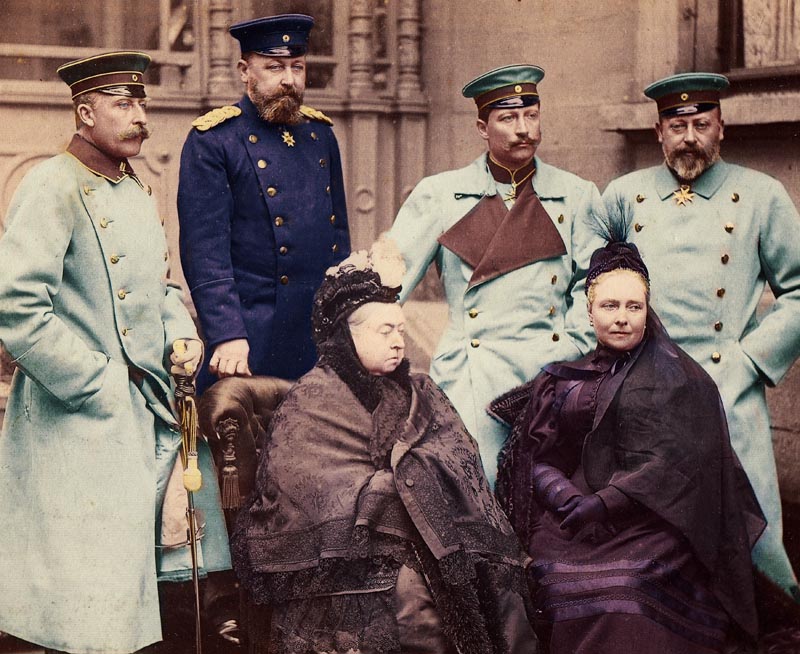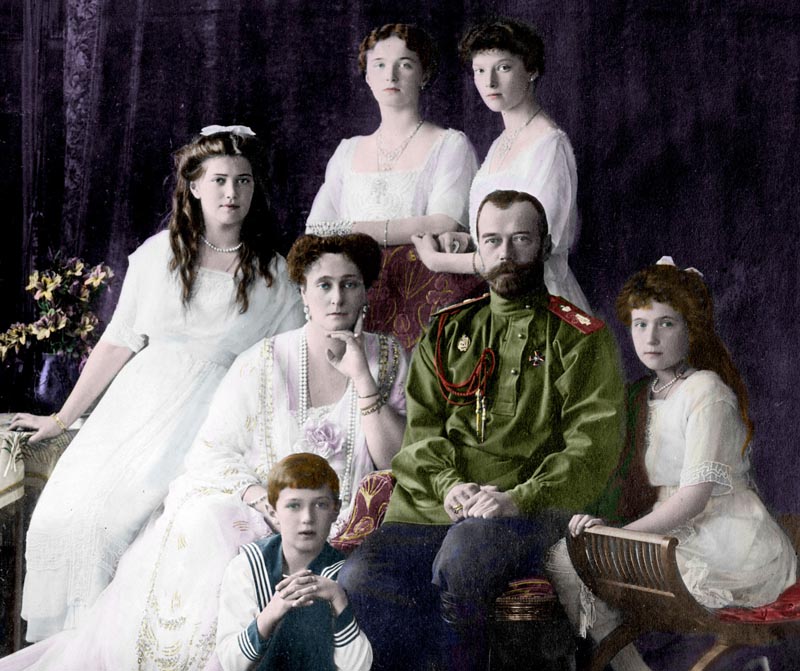Royal Cousins at War, BBC Two | reviews, news & interviews
Royal Cousins at War, BBC Two
Royal Cousins at War, BBC Two
How bombs and bullets proved to be thicker than royal blood

World War One overkill - if you'll pardon the expression - is a clear and present danger as the centenary commemorations gather pace, but this investigation of the roles of the interlinked royal families of Europe in the onrush of hostilities was as good a chunk of TV history as I can remember. Informative and detailed but always keeping an eye on the bigger picture, it made me, at any rate, start to think about the road to 1914 in a different light.
The pivotal figure was Queen Victoria, whose influence we could see reaching far beyond the immense era named after her and onwards into the later 20th century. The bellicose Kaiser Wilhelm II was her grandson (his mother was Victoria's oldest daughter Vicky), her granddaughter Alix of Hesse was the wife of Tsar Nicholas II, and her grandson George V was on the British throne when war broke out. Thus the rulers of three major combatants were cousins with close ties to the British monarchy, and one can only imagine the Old Queen's horror had she been alive to witness the war's ravages and its obliterating impact on her extended family (below, the Kaiser and future Edward VII, on right at rear, with Queen Victoria and daughter Vicky).
 But possibly the most illuminating portion of the film concerned the little-known influence of the Danish royal family in the later years of the 19th century. Victoria's son Albert (later Edward VII) married Denmark's Princess Alexandra, and Alexandra's sister Dagmar (aka Minnie) married the future Tsar Alexander III. Every summer, the Danish royals kept an exceedingly laid-back open house to which their British and Russian in-laws were cordially invited. Also in attendance were representatives of the various lesser provinces which had been conquered and subsumed by Bismarck and the Prussian war machine as it marched towards the unification of Germany in 1871. The Prussians themselves were pointedly omitted from the Danish guest list, which served as a curious advanced warning of the way the battle lines would be drawn up in the apocalyptic late summer of 1914.
But possibly the most illuminating portion of the film concerned the little-known influence of the Danish royal family in the later years of the 19th century. Victoria's son Albert (later Edward VII) married Denmark's Princess Alexandra, and Alexandra's sister Dagmar (aka Minnie) married the future Tsar Alexander III. Every summer, the Danish royals kept an exceedingly laid-back open house to which their British and Russian in-laws were cordially invited. Also in attendance were representatives of the various lesser provinces which had been conquered and subsumed by Bismarck and the Prussian war machine as it marched towards the unification of Germany in 1871. The Prussians themselves were pointedly omitted from the Danish guest list, which served as a curious advanced warning of the way the battle lines would be drawn up in the apocalyptic late summer of 1914.
The prescience of Queen Victoria was another recurring theme, even if it was undermined by the law of unintended consequences. As she pointed out to her son Bertie, "your whole family are German and you are half German." It was with a view to exerting a civilising influence on the brashly militaristic Prussians that Victoria sent daughter Vicky to marry the Crown Prince Frederick, having primed her carefully (according to this version at least) about the importance of her diplomatic mission. It might have worked too, since Vicky and Frederick made a notably enlightened and liberal couple. But complications during the birth of their son Wilhelm, the future Kaiser who went to war, left the child with a disabled left arm. Evidently his feelings of shame and inadequacy in Prussia's macho, militaristic culture festered into a kind of crazed belligerence, and we know all too well where that led (below, Tsar Nicholas II, Alexandra and family).
W hat little light relief was on offer came from accounts of Kaiser Wilhelm's visits to the Cowes sailing week (his attitude towards Britain kept veering berserkly from loathing to fawning groupiedom). Loud, aggressive and cursed with a grossly infantile sense of humour, Wilhelm pissed off just about everybody, and each year at Cowes he would crank up the personal arms race between himself and Bertie, now Edward VII - he'd bring a bigger, flashier yacht, or come with a retinue of German warships which fired their guns at uncouthly inappropriate moments, or arrange for Zeppelins to fly overhead. It began to sound worryingy like a tale of sound and fury, told by an idiot.
hat little light relief was on offer came from accounts of Kaiser Wilhelm's visits to the Cowes sailing week (his attitude towards Britain kept veering berserkly from loathing to fawning groupiedom). Loud, aggressive and cursed with a grossly infantile sense of humour, Wilhelm pissed off just about everybody, and each year at Cowes he would crank up the personal arms race between himself and Bertie, now Edward VII - he'd bring a bigger, flashier yacht, or come with a retinue of German warships which fired their guns at uncouthly inappropriate moments, or arrange for Zeppelins to fly overhead. It began to sound worryingy like a tale of sound and fury, told by an idiot.
rating
Explore topics
Share this article
The future of Arts Journalism
You can stop theartsdesk.com closing!
We urgently need financing to survive. Our fundraising drive has thus far raised £49,000 but we need to reach £100,000 or we will be forced to close. Please contribute here: https://gofund.me/c3f6033d
And if you can forward this information to anyone who might assist, we’d be grateful.

Subscribe to theartsdesk.com
Thank you for continuing to read our work on theartsdesk.com. For unlimited access to every article in its entirety, including our archive of more than 15,000 pieces, we're asking for £5 per month or £40 per year. We feel it's a very good deal, and hope you do too.
To take a subscription now simply click here.
And if you're looking for that extra gift for a friend or family member, why not treat them to a theartsdesk.com gift subscription?
more TV
 Murder Before Evensong, Acorn TV review - death comes to the picturesque village of Champton
The Rev Richard Coles's sleuthing cleric hits the screen
Murder Before Evensong, Acorn TV review - death comes to the picturesque village of Champton
The Rev Richard Coles's sleuthing cleric hits the screen
 Black Rabbit, Netflix review - grime and punishment in New York City
Jude Law and Jason Bateman tread the thin line between love and hate
Black Rabbit, Netflix review - grime and punishment in New York City
Jude Law and Jason Bateman tread the thin line between love and hate
 The Hack, ITV review - plodding anatomy of twin UK scandals
Jack Thorne's skill can't disguise the bagginess of his double-headed material
The Hack, ITV review - plodding anatomy of twin UK scandals
Jack Thorne's skill can't disguise the bagginess of his double-headed material
 Slow Horses, Series 5, Apple TV+ review - terror, trauma and impeccable comic timing
Jackson Lamb's band of MI5 misfits continues to fascinate and amuse
Slow Horses, Series 5, Apple TV+ review - terror, trauma and impeccable comic timing
Jackson Lamb's band of MI5 misfits continues to fascinate and amuse
 Coldwater, ITV1 review - horror and black comedy in the Highlands
Superb cast lights up David Ireland's cunning thriller
Coldwater, ITV1 review - horror and black comedy in the Highlands
Superb cast lights up David Ireland's cunning thriller
 Blu-ray: The Sweeney - Series One
Influential and entertaining 1970s police drama, handsomely restored
Blu-ray: The Sweeney - Series One
Influential and entertaining 1970s police drama, handsomely restored
 I Fought the Law, ITVX review - how an 800-year-old law was challenged and changed
Sheridan Smith's raw performance dominates ITV's new docudrama about injustice
I Fought the Law, ITVX review - how an 800-year-old law was challenged and changed
Sheridan Smith's raw performance dominates ITV's new docudrama about injustice
 The Paper, Sky Max review - a spinoff of the US Office worth waiting 20 years for
Perfectly judged recycling of the original's key elements, with a star turn at its heart
The Paper, Sky Max review - a spinoff of the US Office worth waiting 20 years for
Perfectly judged recycling of the original's key elements, with a star turn at its heart
 The Guest, BBC One review - be careful what you wish for
A terrific Eve Myles stars in addictive Welsh mystery
The Guest, BBC One review - be careful what you wish for
A terrific Eve Myles stars in addictive Welsh mystery
 theartsdesk Q&A: Suranne Jones on 'Hostage', power pants and politics
The star and producer talks about taking on the role of Prime Minister, wearing high heels and living in the public eye
theartsdesk Q&A: Suranne Jones on 'Hostage', power pants and politics
The star and producer talks about taking on the role of Prime Minister, wearing high heels and living in the public eye
 King & Conqueror, BBC One review - not many kicks in 1066
Turgid medieval drama leaves viewers in the dark
King & Conqueror, BBC One review - not many kicks in 1066
Turgid medieval drama leaves viewers in the dark
 Hostage, Netflix review - entente not-too-cordiale
Suranne Jones and Julie Delpy cross swords in confused political drama
Hostage, Netflix review - entente not-too-cordiale
Suranne Jones and Julie Delpy cross swords in confused political drama

Add comment